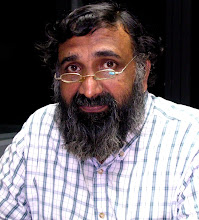Mere Desh Ki Dharti
"Mumbai-based filmmaker Sumit Khanna first embarked on the pesticides trail when he noticed the absence of the common sparrow from the green fields of Punjab. "Why is it, I thought to myself, that the sparrows have stopped making the fields their home despite the apparent presence of food? And then I discovered that the crop is so heavily sprayed with pesticide that no bird or beast can hope to survive in the fields," says Khanna. This process of discovery took the route of a 58-minute documentary film, financed by the Public Service Broadcasting Trust (PSBT). To add a touch of irony, Khanna titled his film Mere Desh Ki Dharti, a popular song from a Hindi film that pays tribute to the abundance of food, water and happiness in India." This is a quote from an article in Infochange
I am reminded of very similar ideas expressed in a book that ultimately turned out to be one of the pioneering books on the environmental movement. It was written by Rachel Carson and was called Silent Spring. She starts with the concern about birds disappearing, and along with them, bird songs. And she goes on to show, in chapter after disgusting chapter, how technology in the form of chemicals that kill insects has destroyed bird populations. How nature has been silenced. How humans took 'control' of nature and came pretty close to destroying themselves.
Have we not learnt any lesson from all the heart-breaking episodes that Ms. Rachel described almost a half century ago? Do we have to replay all those absurd scenes again? Do we have to repeat all the mistakes that the West made? Are we always going to be followers of the so-called "developed" world? Why are we afraid of following our own path of progress? I admit that the 'West', or the 'North' as some prefer to say, has succeeded in brainwashing us into believing that theirs is the only way to achieving "development". This is a word I dislike using in this context, since it signifies growth, and I believe that growth is not the way to go forward. Continuous growth signifies infinite resources, since growth generally is taken to mean increasing consumption of resources. So I prefer the word "progress", which really does not imply growth (as in "progress along our way", for example).
Even if there is no destination, which seems to be clear, let us look for progress on our path, than for growth and development. Let us look for more equitable sharing of resources, less conflicts within society, less contradictions with nature. Let us think more of co-operation that competition. Let us forget about efficiency and think more about equity, for instance. Yes, that should be our path, and we could, perhaps, progress continuously along this path without creating trouble for other species. We are quite suited to set an example for the world in this matter, due to our unique history and philosophy of 'live and let live'. So let us lead the world rather than follow others.
Subscribe to:
Post Comments (Atom)

2 comments:
I don't know when we are gonna change. Just remembered ONV's "Bhoomikkoru Charama Geetham"
oh my god .."It’s estimated that around 800,000 people in developing countries may have died due to pesticides since the onset of the Green Revolution". What about the rest..birds,animals..:(
Some crucial questions from a kid
http://www.youtube.com/watch?v=TQmz6Rbpnu0
Thank you, Uppayi, especially for the YouTube link. I think this speech should be aired at every meeting where the participants can understand English. And made available with translations in other languages too. This should be made compulsory lesson for everyone in the global North. Thanks, again.
Post a Comment